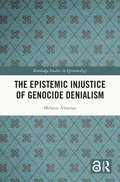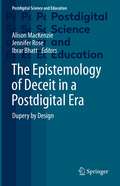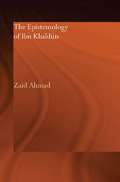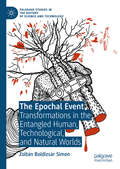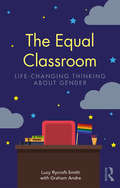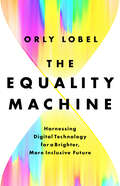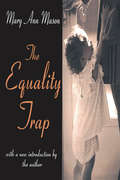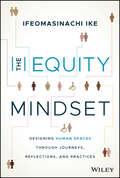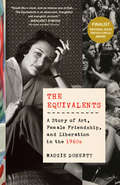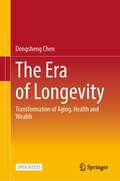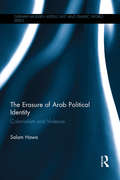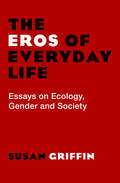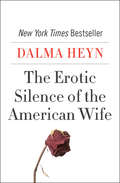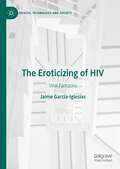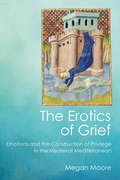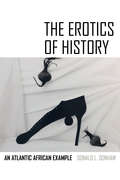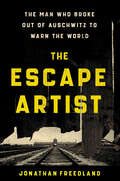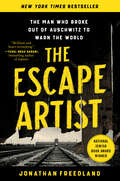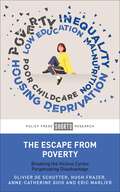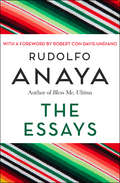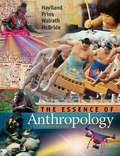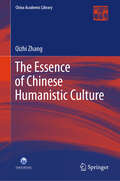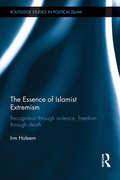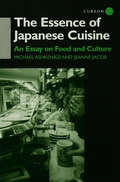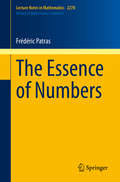- Table View
- List View
The Epistemic Injustice of Genocide Denialism (Routledge Studies in Epistemology)
by Melanie AltanianThe injustice of genocide denial is commonly understood as a violation of the dignity of victims, survivors, and their descendants, and further described as an assault on truth and memory. This book rethinks the normative relationship between dignity, truth, and memory in relation to genocide denial by adopting the framework of epistemic injustice.This framework performs two functions. First, it introduces constructive normative vocabulary into genocide scholarship through which we can gain a better understanding of the normative impacts of genocide denial when it is institutionalized and systematic. Second, it develops and enriches current scholarship on epistemic injustice with a further, underexplored case study. Genocide denialism is relevant for political and social epistemology, as it presents a substantive epistemic practice that distorts normativity and social reality in ways that maintain domination. This generates pervasive ignorance that makes denial rather than recognition of genocide appear as the morally and epistemically right thing to do. By focusing on the prominent case of Turkey’s denialism of the Armenian genocide, the book shows the serious consequences of this kind of epistemic injustice for the victim group and society as a whole.The Epistemic Injustice of Genocide Denialism will appeal to students and scholars working in social, political, and applied epistemology, social and political philosophy, genocide studies, Armenian studies, and memory studies.The Open Access version of this book, available at www.taylorfrancis.com, has been made available under a Creative Commons Attribution-Non Commercial-No Derivatives (CC-BY-NC-ND) 4.0 license. Any third party material in this book is not included in the OA Creative Commons license, unless indicated otherwise in a credit line to the material. Please direct any permissions enquiries to the original rightsholder.Funded by: Swiss National Science Foundation
The Epistemology of Deceit in a Postdigital Era: Dupery by Design (Postdigital Science and Education)
by Jennifer Rose Ibrar Bhatt Alison MacKenzieThis edited book collection offers strong theoretical and philosophical insight into how digital platforms and their constituent algorithms interact with belief systems to achieve deception, and how related vices such as lies, bullshit, misinformation, disinformation, and ignorance contribute to deception. This inter-disciplinary collection explores how we can better understand and respond to these problematic practices. The Epistemology of Deceit in a Postdigital Era: Dupery by Design will be of interest to anyone concerned with deception in a ‘postdigital’ era including fake news, and propaganda online. The election of populist governments across the world has raised concerns that fake news in online platforms is undermining the legitimacy of the press, the democratic process, and the authority of sources such as science, the social sciences and qualified experts. The global reach of Google, YouTube, Twitter, Facebook, and other platforms has shown that they can be used to create and spread fake and misleading news quickly and without control. These platforms operate and thrive in an increasingly balkanised media eco-system where networks of users will predominantly access and consume information that conforms to their existing worldviews. Conflicting positions, even if relevant and authoritative, are suppressed, or overlooked in everyday digital information consumption. Digital platforms have contributed to the prolific spread of false information, enabled ignorance in online news consumers, and fostered confusion over determining fact from fiction. The collection explores: Deception, what it is, and how its proliferation is achieved in online platforms. Truth and the appearance of truth, and the role digital technologies play in pretending to represent truth. How we can counter these vices to protect ourselves and our institutions from their potentially baneful effects. Chapter 15 is available open access under a Creative Commons Attribution 4.0 International License via link.springer.com.
The Epistemology of Ibn Khaldun (Culture and Civilization in the Middle East)
by Zaid AhmadThis is an analytical examination of Ibn Khaldun's epistemology, centred on Chapter Six of the Muqaddima. In this chapter, entitled The Book of Knowledge (Kitab al'Ilm), Ibn Khaldun sketched his general ideas about knowledge and science and its relationship with human social organisation and the establishment of a civilisation.
The Epochal Event: Transformations in the Entangled Human, Technological, and Natural Worlds (Palgrave Studies in the History of Science and Technology)
by Zoltán Boldizsár SimonThis book is a unique attempt to capture the growing societal experience of living in an age unlike anything the world has ever seen. Fueled by the perception of acquiring unprecedented powers through technologies that entangle the human and the natural worlds, human beings have become agents of a new kind of transformative event. The ongoing sixth mass extinction of species, the prospect of a technological singularity, and the potential crossing of planetary boundaries are expected to trigger transformations on a planetary scale that we deem catastrophic and try to avoid. In making sense of these prospects, Simon’s book sketches the rise of a new epochal thinking, introduces the epochal event as an emerging category of a renewed historical thought, and makes the case for the necessity of bringing together the work of the human and the natural sciences in developing knowledge of a more-than-human world.
The Equal Classroom: Life-Changing Thinking About Gender
by Lucy Rycroft-Smith Graham AndreHow much thinking have you done about gender? What does it feel like to be gay, trans or non-binary at school? How unbiased, safe and inclusive are our teachers, our schools and our systems, and what can we do about it? The time is ripe for a re-think, and the issues are pressing. Our pupils are grappling with challenges around gender and sexuality, and they need our well-informed support. Providing evidence, prompts and the space to explore the implications, restrictions and constructs of gender, this book is here to help every teacher reflect on issues around gender roles and expectations in their class. In this challenging and potent book, experts, academics and campaigners join forces to contribute important perspectives to complement Rycroft-Smith’s own accessible and often provocative explanations of many facets of gender and sexuality, including media, literature, toys, clothing, sexism, expectations, sexuality, gender roles, harassment and consent. Humour and anecdotes are thoughtfully intertwined with fascinating insights into biological and cultural perspectives and societal norms, highlighting why it’s so vital to teach pupils about gender issues, as well as modelling consent, good quality relationships and tolerance to children at all ages and stages of their school career. Providing clear, practical policy recommendations in an accessible and engaging way, The Equal Classroom is an essential read for any teacher or education professional who wants to ensure their school is a place where all pupils feel truly welcome and able to flourish, comfortable and safe in their emerging identities.
The Equality Machine: Harnessing Digital Technology for a Brighter, More Inclusive Future
by Orly LobelAN ECONOMIST BEST BOOK OF 2022 At a time when AI and digital platforms are under fire, Orly Lobel, a renowned tech policy scholar, defends technology as a powerful tool we can harness to achieve equality and a better future. Much has been written about the challenges tech presents to equality and democracy. But we can either criticize big data and automation or steer it to do better. Lobel makes a compelling argument that while we cannot stop technological development, we can direct its course according to our most fundamental values. With provocative insights in every chapter, Lobel masterfully shows that digital technology frequently has a comparative advantage over humans in detecting discrimination, correcting historical exclusions, subverting long-standing stereotypes, and addressing the world&’s thorniest problems: climate, poverty, injustice, literacy, accessibility, speech, health, and safety. Lobel's vivid examples—from labor markets to dating markets—provide powerful evidence for how we can harness technology for good. The book&’s incisive analysis and elegant storytelling will change the debate about technology and restore human agency over our values.
The Equality Trap
by E. TillyardDespite the feminist revolution of the past twenty years, most women in America are worse off today than at any time in the recent past. Magazines and television programs profile women bank executives, surgeons, and corporate lawyers, but the vast majority of women still work in relatively low-paying jobs. Women work more hours per week in the house and outside than ever before, and a paying job has become a necessity for women in most households. What went wrong? In this provocative book, Mary Ann Mason argues that the women's movement shares some of the blame for this situation. In an original analysis that draws on both social and legal history, she explains how the move away from women's rights toward equal rights has worsened the situation of American working women, especially working mothers. Because women are still the primary care-providers for their children, they must take flexible and relatively low-paying jobs to be available in case of a child-care problem. With nearly 50 percent of all marriages now ending in divorce, and with a growing trend-inspired by the equal rights movement-toward no-fault divorce and low- or no-alimony settlements, divorced mothers frequently find themselves economically devastated. Mary Ann Mason argues that the solution to this predicament is to draw up a new women's rights agenda that will benefit all working women, especially those with children. The equal-rights strategy was important in opening the door for the highly publicized super-achievers, but it is now time, she says, to improve the lives of the majority of America's working women. This book will be of interest to readers interested in gender studies, and particularly issues of equality and feminism. Mary Ann Mason is a professor of law and social welfare at the University of California, Berkeley. In addition to her law degree, Mason holds a Ph.D. in American social history.
The Equity Mindset: Designing Human Spaces Through Journeys, Reflections and Practices
by Ifeomasinachi IkeLearn to implement the intentional practices and make the hard decisions that true equity demands In The Equity Mindset, celebrated researcher, attorney, and activist Ifeomasinachi Ike delivers a moving and impactful exploration of why equity is so important, the shortcomings of institutional diversity and inclusion (D&I) initiatives, and how we creatively and boldly design cultures centering the expertise of those who know first-hand how inequity has shaped work culture. The book examines the dynamics of normalized institutional oppression, offers real-world case studies, and provides readers with new practices, key performance indicators (KPIs), and milestones for measuring the success of modern DEI efforts. At its core, The Equity Mindset is about adopting a problem-solving mentality to address social inequities to ensure we all thrive. This nuanced treatment of principles, practices, and production also includes: Practitioner interviews with guidance on how each person, regardless of industry, can advance equity personally and professionally Strategies for addressing organizational bias, inequity, and lack of representation Tools for leaders and decisionmakers seeking concrete steps to create safer cultures for communities historically marginalized A can’t-miss resource for managers, executives, board members, and other business leaders, The Equity Mindset is for those with and without traditional authority who seek to advance the movement for equitable treatment in every environment.
The Equivalents: A Story of Art, Female Friendship, and Liberation in the 1960s
by Maggie DohertyThe timely, never-before-told story of five brilliant, passionate women who, in the early 1960s, converged at the newly founded Radcliffe Institute for Independent Study and became friends as well as artistic collaborators, and who went on to shape the course of feminism in ways that are still felt today.In 1960, Harvard's sister college, Radcliffe, announced the founding of an Institute for Independent Study, a "messy experiment" in women's education that offered paid fellowships to those with a PhD or "the equivalent" in artistic achievement. Five of the women who received fellowships--poets Anne Sexton and Maxine Kumin, painter Barbara Swan, sculptor Mariana Pineda, and writer Tillie Olsen--quickly formed deep bonds with one another that would inspire and sustain their most ambitious work. They called themselves "the Equivalents." Drawing from notebooks, letters, recordings, journals, poetry, and prose, Maggie Doherty weaves a moving narrative of friendship and ambition, art and activism, love and heartbreak, and shows how the institute spoke to the condition of women on the cusp of liberation.
The Era of Longevity: Transformation of Aging, Health and Wealth
by Dongsheng ChenThis is an open access book under CC BY-NC-ND.This open access book is a comprehensive solution proposed by Dr. Chen Dongsheng for the issues of medical care, pension, and fund raising in the era of longevity. This book studies the relationship among aging population, economic development, and business model innovation. It integrates multi-disciplinary, multi-industry, and multi-professional research and thinking to focus on how to meet the challenge of aging population from business perspective. The author analyzes the keys and experience for Taikang to get successful in this area. The arrival of the "Era of Longevity" not only creates new business opportunities, but also changes the economy, governance, and cultural ecology of the society. It is of interest to the readers in business and policy-making.
The Erasure of Arab Political Identity: Colonialism and Violence (Durham Modern Middle East and Islamic World Series)
by Salam HawaThis book explores the long history of the evolution of Arab political identity, which predates the time of the Prophet Muhammad and is characterized by tolerance, compassion, generosity, hospitality, self-control, correct behaviour, equality and consensus. The author argues that present-day struggles in many Arab countries to redefine polities and politics are related to the fact that the underlying political culture of the Arabs has been overridden for centuries by successive political regimes which have deviated from the original political culture that the Prophet adhered to. The book outlines the political culture that existed before Islam, examines how the Conquests and the rule of the early dynasties (Umayyad and Abbasid) of the Islamic world found it necessary to override it, and analyses the effect of rule by non-Arabs – successively Mamluks, Ottoman Turks and Western colonial powers. It discusses the impact of these distortions on present day politics in the Arab world, and concludes by appealing for a reawakening of, and respect for, the cultural elements underlying the origins of Arab political identity.
The Eros of Everyday Life: Essays on Ecology, Gender and Society
by Susan GriffinA brilliant collection of thought-provoking essays on gender, nature, passion, and society from an acclaimed feminist, philosopher, and poet In The Eros of Everyday Life, one of America's most provocative writers and thinkers offers insightful and compelling views on a wide range of social, ecological, and gender issues. From a distinctly feminist point of view, Susan Griffin explores the intricate connections between science and religion, nature and society, women and men, and love and consciousness. She brilliantly commingles lyrical memoir with cogent social commentary, producing a colorful literary tapestry that examines contemporary life and culture, its contradictions and complexities, and the rise of new ideologies. The Eros of Everyday Life showcases a decade's worth of the very best writing by this acclaimed Pulitzer Prize and National Book Critics Circle Award finalist. It is an enthralling anthology that reveals the ways in which Western society undermines itself by diminishing both woman and the natural environment, and yet it is also a celebration of the power of passion, and the remarkable evolution of the human capacity for love.
The Erotic Silence of the American Wife
by Dalma HeynTold in women's own words, this revolutionary book broke the silence surrounding women and adulteryDalma Heyn knows that wives have affairs--and why. She's spoken with hundreds of women who, desperate to break free of their quest to be the stereotypical "perfect wife," have reluctantly looked outside their marriages to find the pleasure and connection that eluded them. Her extensive first-person interviews and compelling case stories present a nuanced view of women's sexuality and marriage. Heyn contextualizes these stories with a critique of the cultural expectations placed on women by literature, experts, the institution of marriage, and themselves. Shocking and revelatory, The Erotic Silence of the American Wife is a groundbreaking book as vital to understanding marriage--and its unspoken effects on women's and men's relationships--as it was when it was first published. This ebook features an introduction by Dalma Heyn and an illustrated biography including rare photos from the author's personal collection.
The Eroticizing of HIV: Viral Fantasies (Health, Technology and Society)
by Jaime García-IglesiasThis book examines sexual fantasies and their influence on everyday life through the stories of twenty-two men who introduce themselves as bugchasers, i.e. gay men who eroticize HIV. The author defines bugchasing, charts its history and contexts, and considers how it has changed in the age of internet and PrEP. Through the participants, their experiences and contexts, this text also theorizes about sexual fantasies, seeking to understand how people define sexual fantasies and use the internet as a space to navigate their desires, meet others, and find support. Chapters also consider the practical implications of fantasy, most notably, how fantasies influence men’s decisions around HIV prevention and care. This book speaks to renewed interest in both the AIDS crisis and the sociology of everyday life to illustrate how fantasies such as bugchasing appear, evolve, and adapt. This book will be of interest to scholars focused on queer studies, sexuality studies, gender studies, and healthcare.
The Erotics of Grief: Emotions and the Construction of Privilege in the Medieval Mediterranean
by Megan MooreThe Erotics of Grief considers how emotions propagate power by exploring whose lives are grieved and what kinds of grief are valuable within and eroticized by medieval narratives. Megan Moore argues that grief is not only routinely eroticized in medieval literature but that it is a foundational emotion of medieval elite culture. Focusing on the concept of grief as desire, Moore builds on the history of the emotions and Georges Bataille's theory of the erotic as the conflict between desire and death, one that perversely builds a sense of community organized around a desire for death. The link between desire and death serves as an affirmation of living communities. Moore incorporates literary, visual, and codicological evidence in sources from across the Mediterranean—from Old French chansons de geste, such as the Song of Roland and La mort le roi Artu and romances such as Erec et Enide, Philomena, and Floire et Blancheflor; to Byzantine and ancient Greek novels; to Middle English travel narratives such as Mandeville's Travels. In her reading of the performance of grief as one of community and remembrance, Moore assesses why some lives are imagined as mattering more than others and explores how a language of grief becomes a common language of status among the medieval Mediterranean elite.
The Erotics of History: An Atlantic African Example
by Donald L. DonhamAt publication date, a free ebook version of this title will be available through Luminos, University of California Press’s Open Access publishing program. Visit www.luminosoa.org to learn more.The Erotics of History challenges long-standing notions of sexuality as stable and context-free--as something that individuals discover about themselves. Rather, Donald L. Donham argues that historical circumstance, local social pressure, and the cultural construction of much beyond sex condition the erotic. Donham makes this argument in relation to the centuries-old conversation on the fetish, applied to a highly unusual neighborhood in Atlantic Africa. There, local men, soon to be married to local women, are involved in long-term sexual relationships with European men. On the African side, these couplings are motivated by the pleasures of cosmopolitan connection and foreign commodities. On the other side, Europeans tend to fetishize Africans’ race, while a few search to become slaves in master/ slave relationships. At its most wide ranging, The Erotics of History attempts to show that it is history, both personal and collective, in reversals and reenactments, that finally produces sexual excitement.
The Escape Artist: The Man Who Broke Out of Auschwitz to Warn the World
by Jonathan FreedlandA complex hero. A forgotten story. The first witness to reveal the full truth of the Holocaust. <p><p>Jonathan Freedland, award-winning journalist and bestselling novelist, tells the incredible story of Rudolf Vrba—the first Jew to break out of Auschwitz, a man determined to warn the world and pass on a truth too few were willing to hear—elevating him to his rightful place in the annals of World War II alongside Anne Frank, Primo Levi, and Oskar Schindler and casting a new light on the Holocaust and its aftermath. <p><p>People won’t believe what they can’t imagine . . . In April 1944, Rudolf Vrba became the first Jew to break out of Auschwitz—one of only four who ever pulled off that near-impossible feat. He did it to reveal the truth of the death camp to the world—and to warn the last Jews of Europe what fate awaited them at the end of the railway line. Against all odds, he and his fellow escapee, Fred Wetzler, climbed mountains, crossed rivers and narrowly missed German bullets until they had smuggled out the first full account of Auschwitz the world had ever seen—a forensically detailed report that would eventually reach Franklin Roosevelt, Winston Churchill and the Pope. And yet too few heeded the warning that Vrba—then just nineteen years old—had risked everything to deliver. Some could not believe it. Others thought it easier to keep quiet. Vrba helped save 200,000 Jewish lives—but he never stopped believing it could have been so many more. <p><p>This is the story of a brilliant yet troubled man—a gifted “escape artist” who even as a teenager understand that the difference between truth and lies can be the difference between life and death, a man who deserves to take his place alongside Anne Frank, Oskar Schindler and Primo Levi as one of the handful of individuals whose stories define our understanding of the Holocaust. <p> <b>New York Times Bestseller</b>
The Escape Artist: The Man Who Broke Out of Auschwitz to Warn the World
by Jonathan FreedlandWinner of the National Jewish Book Award · New York Times Bestseller"A brilliant and heart-wrenching book, with universal and timely lessons about the power of information—and misinformation. Is it possible to stop mass murder by telling the truth?" — Yuval Noah Harari, bestselling author of Sapiens: A Brief History of Humankind and Homo Deus: A Brief History of TomorrowA complex hero. A forgotten story. The first witness to reveal the full truth of the Holocaust . . .Award-winning journalist and bestselling novelist Jonathan Freedland tells the astonishing true story of Rudolf Vrba, the man who broke out of Auschwitz to warn the world of a truth too few were willing to hear.In April 1944, Rudolf Vrba became one of the very first Jews to escape from Auschwitz and make his way to freedom—among only a tiny handful who ever pulled off that near-impossible feat. He did it to reveal the truth of the death camp to the world—and to warn the last Jews of Europe what fate awaited them. Against all odds, Vrba and his fellow escapee, Fred Wetzler, climbed mountains, crossed rivers, and narrowly missed German bullets until they had smuggled out the first full account of Auschwitz the world had ever seen—a forensically detailed report that eventually reached Franklin Roosevelt, Winston Churchill, and the Pope.And yet too few heeded the warning that Vrba had risked everything to deliver. Though Vrba helped save two hundred thousand Jewish lives, he never stopped believing it could have been so many more.This is the story of a brilliant yet troubled man—a gifted “escape artist” who, even as a teenager, understood that the difference between truth and lies can be the difference between life and death. Rudolf Vrba deserves to take his place alongside Anne Frank, Oskar Schindler, and Primo Levi as one of the handful of individuals whose stories define our understanding of the Holocaust.
The Escape from Poverty: Breaking the Vicious Cycles Perpetuating Disadvantage
by Eric Marlier Olivier De Schutter Hugh Frazer Anne-Catherine GuioePDF and ePUB available Open Access under CC-BY-NC-ND license. The perpetuation of poverty across generations damages lives. It weakens social cohesion and the economy and undermines environmental sustainability. This book examines why poverty is carried on from one generation to the next and what needs to be done to eradicate it. This book draws on a wide variety of sources and academic disciplines (social sciences, economics, law, community development, neuroscience and developmental psychology) along with the lived experience of people in poverty. Challenging the myths and prejudices about poverty that hinder progress, it calls for a comprehensive approach based on ensuring real equality of opportunity for all. It stresses the need to intervene early to combat child poverty and break the vicious cycles that perpetuate poverty and disadvantage.
The Essays: Essays On The Chicano Homeland (Chicana And Chicano Visions Of The Americas Ser. #7)
by Rudolfo Anaya Robert con Davis-UndianoFifty-two essays exploring identity, literature, immigration, and politics by one of the godfathers of Chicano literature In his essay "The New World Man," Rudolfo Anaya writes, "I stand poised at the center of power, the knowing of myself, the heart and soul of the New World man alive in me." Best known for his novel Bless Me, Ultima, which established him as one of the founders of Chicano literature, The Essays illustrates Anaya's gift for storytelling and his deep connection to the land and its history. These intimate and contemplative essays explore censorship, immigration, urban development, the Southwest as a region, and personal identity. In "Aztlan: A Homeland Without Boundaries," he discusses the reimagining of the modern Chicano community through ancient myth and legend; in "The Spirit of Place," he explores the historical connection between literature and the earth. Some essays are autobiographical, some argumentative; all are passionate. A must-have for Anaya fans and readers of Chicano literature, this book will also appeal to anyone eager to explore contemporary America through fresh eyes.
The Essence Of Anthropology
by Dana Walrath William Haviland Harald Prins Bunny McBrideTHE ESSENCE OF ANTHROPOLOGY features an experienced and diverse author team with expertise in all subfields of anthropology. With an eye to visual and written clarity, the authors present anthropology from an integrated, holistic perspective. They use three unifying themes as a framework to tie the book together and keep students focused: systemic adaptation to emphasize that every culture, past and present, is an integrated and dynamic system of adaptation; biocultural connections that highlight the integration of human culture and biology in the steps humans take to meet the challenges of survival; and the emergence of globalization and its disparate impact on peoples and cultures around the world. Pedagogical elements support these main themes and give deeper insight into the meaning and relevance of a wide range of topics covered in the general narrative by tying examples to behavior today. Insightful questions foster critical thinking, additional Visual Counterpoints widen the book's array of compare-and-contrast examples, and a new Digging into Anthropology feature provides a hands-on approach to anthropological methods by giving active learning opportunities related to each chapter's content. In addition, the authors have broadened viewpoints to offer explanations and examples from different points of view.
The Essence of Chinese Humanistic Culture (China Academic Library)
by Qizhi ZhangThis book presents a comprehensive and inclusive exploration of the core essence of Chinese civilization and its deeply-rooted humanistic values. It goes beyond the surface and delves into the philosophical, ethical, and historical aspects, aiming to unravel the profound characteristics and spiritual significance of Chinese culture. Taking an interdisciplinary approach, the book carefully examines classical texts, traditional values, moral principles, and cultural legacies that have shaped the Chinese humanistic spirit throughout history. By doing so, it offers readers a deep understanding of the rich cultural heritage that China possesses. One of the highlights of the book is its exploration of the relevance of Chinese cultural traditions and values in today’s society. It sheds new light on the significance of the Chinese humanistic spirit in the modern world, demonstrating its enduring importance and its potential to address contemporary issues.
The Essence of Islamist Extremism: Recognition through Violence, Freedom through Death (Routledge Studies in Political Islam)
by Irm HaleemThis book provides a critical and a conceptual analysis of radical Islamist rhetoric drawn from temporally and contextually varied Islamist extremist groups, challenging the popular understanding of Islamist extremism as a product of a ‘clash-of-civilizations’. Arguing that the essence of Islamist extremism can only be accurately understood by drawing a distinction between the radical Islamist explanations and justifications of violence, the author posits that despite the radical Islamist contextualization of violence within Islamic religious tenets, there is nothing conceptually or distinctly Islamic about Islamist extremism. She engages in a critical analysis of the nature of reason in radical Islamist rhetoric, asserting that the radical Islamist explanations of violence are conceptually reasoned in terms of existential Hegelian struggles for recognition (as fundamentally struggles against oppression), and the radical Islamist justifications of violence are conceptually reasoned in terms of moral consequentialism. With a detailed analysis of Islamist extremist discourse spanning a wide range of contexts, this book has a broad relevance for scholars and students working in the field of Islamic studies, religious violence, philosophy and political theory.
The Essence of Japanese Cuisine: An Essay on Food and Culture
by Michael Ashkenazi Jeanne Jacob Michael Ashkenazi Michael AshkenaziThe past few years have shown a growing interest in cooking and food, as a result of international food issues such as BSE, world trade and mass foreign travel, and at the same time there has been growing interest in Japanese Studies since the 1970s. This volume brings together the two interests of Japan and food, examining both from a number of perspectives. The book reflects on the social and cultural side of Japanese food, and at the same time reflects also on the ways in which Japanese culture has been affected by food, a basic human institution. Providing the reader with the historical and social bases to understand how Japanese cuisine has been and is being shaped, this book assumes minimal familiarity with Japanese society, but instead explores the country through the topic of its cuisine.
The Essence of Numbers (Lecture Notes in Mathematics #2278)
by Frédéric PatrasThis book considers the manifold possible approaches, past and present, to our understanding of the natural numbers. They are treated as epistemic objects: mathematical objects that have been subject to epistemological inquiry and attention throughout their history and whose conception has evolved accordingly. Although they are the simplest and most common mathematical objects, as this book reveals, they have a very complex nature whose study illuminates subtle features of the functioning of our thought. Using jointly history, mathematics and philosophy to grasp the essence of numbers, the reader is led through their various interpretations, presenting the ways they have been involved in major theoretical projects from Thales onward. Some pertain primarily to philosophy (as in the works of Plato, Aristotle, Kant, Wittgenstein...), others to general mathematics (Euclid's Elements, Cartesian algebraic geometry, Cantorian infinities, set theory...). Also serving as an introduction to the works and thought of major mathematicians and philosophers, from Plato and Aristotle to Cantor, Dedekind, Frege, Husserl and Weyl, this book will be of interest to a wide variety of readers, from scholars with a general interest in the philosophy or mathematics to philosophers and mathematicians themselves.
